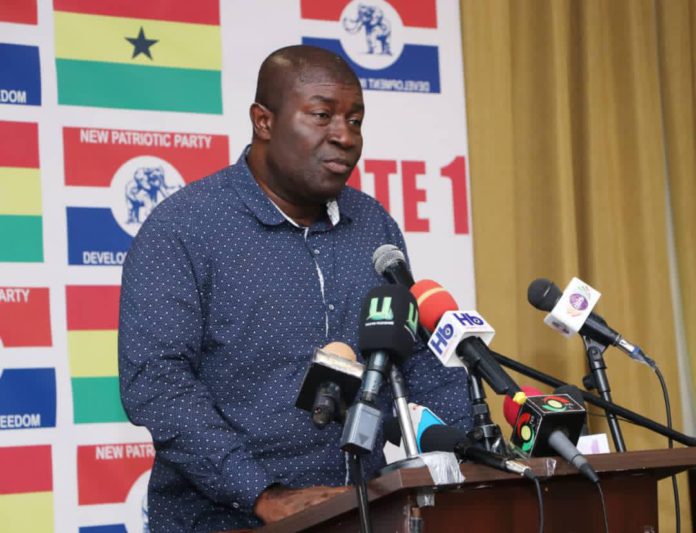President Nana Akufo-Addo has no equal when it comes to industrialising the country in the Fourth Republic, the governing New Patriotic Party (NPP) has said.
“Though we do not have a factory in each district, the progress achieved in industrialisng Ghana by President Akufo-Addo’s government cannot be beaten, in the history of the Fourth Republic,” Nana Akomea, a member of the communications team of the NPP said.
Addressing a press conference in Accra on Monday, November 9, 2020, Mr Akomea argued that, under the Akufo-Addo administration Ghana has seen the most determined push to achieve an industrial economy since President Kwame Nkrumah.
“Ghanaians, particularly the youth, must vote for this determined effort to secure for ourselves an industrialised country that produces and sells for exports and the local market, chocolate instead of cocoa beans, gold trinklets/ornaments instead of the raw metal, aluminum ingots instead of bauxite, cassava and potato chips alongside raw cassava and potato, yam chips alongside yam, processed pepper alongside raw pepper, canned tomatoes alongside the raw produce, fragrant rice instead of raw unprocessed rice, etc, etc,” he charged.
He continued: “This industrial push, coupled with free Senior High School and the systematic digitisation of Ghanaian social and economic processes, will very much secure for ourselves a country where no youth is uneducated, with a vibrant industrial economy and a modernised digital society.”
After Ghana’s independence in 1957, Mr Akomea said President Nkrumah made a determined effort to industrialise the county by setting up dozens of factories, particularly in Tema. However, 50 years after President Nkrumah: “We still are not an industrialised economy that is capable of throwing up thousands of jobs for young people, on a sustainable basis,” the Managing Director of STC Ghana Limited pointed out.
“Therefore, President Akufo-Addo, in his determination to transform the economy of this country, to secure for this country all the benefits of a rich economy, promised this country that he would make another determined effort to industrialise this country, dubbing the promise 1D1F,” he said.
The Akufo-Addo government since 2017 has facilitated the setting up of factories, across the country, in a new determined, effort and plan, to deliver an industrial economy.
Under a new one, away from the traditional and straight forward and use of public funds, whether borrowed or raised through taxation, to set up factories, they are being set up by the private business with the government providing the enabling environment and support.
“This model has been carefully crafted so as to avoid the mistakes of the past, and to ensure success. This model and process are to ensure the factory has a great chance to succeed and to provide jobs, contribute to value addition to agriculture produce and generally to the GDP of Ghana, without undue exposure of taxpayers’ funds,” he said.
Some 76 1D1F factories are in operation as of July 2020. Of these, 28 are new factories, while 48 are existing factories that have taken advantage of the 1D1F scheme to expand and add on new production units. In all, a total of 232 factories are also at various stages of completion.

